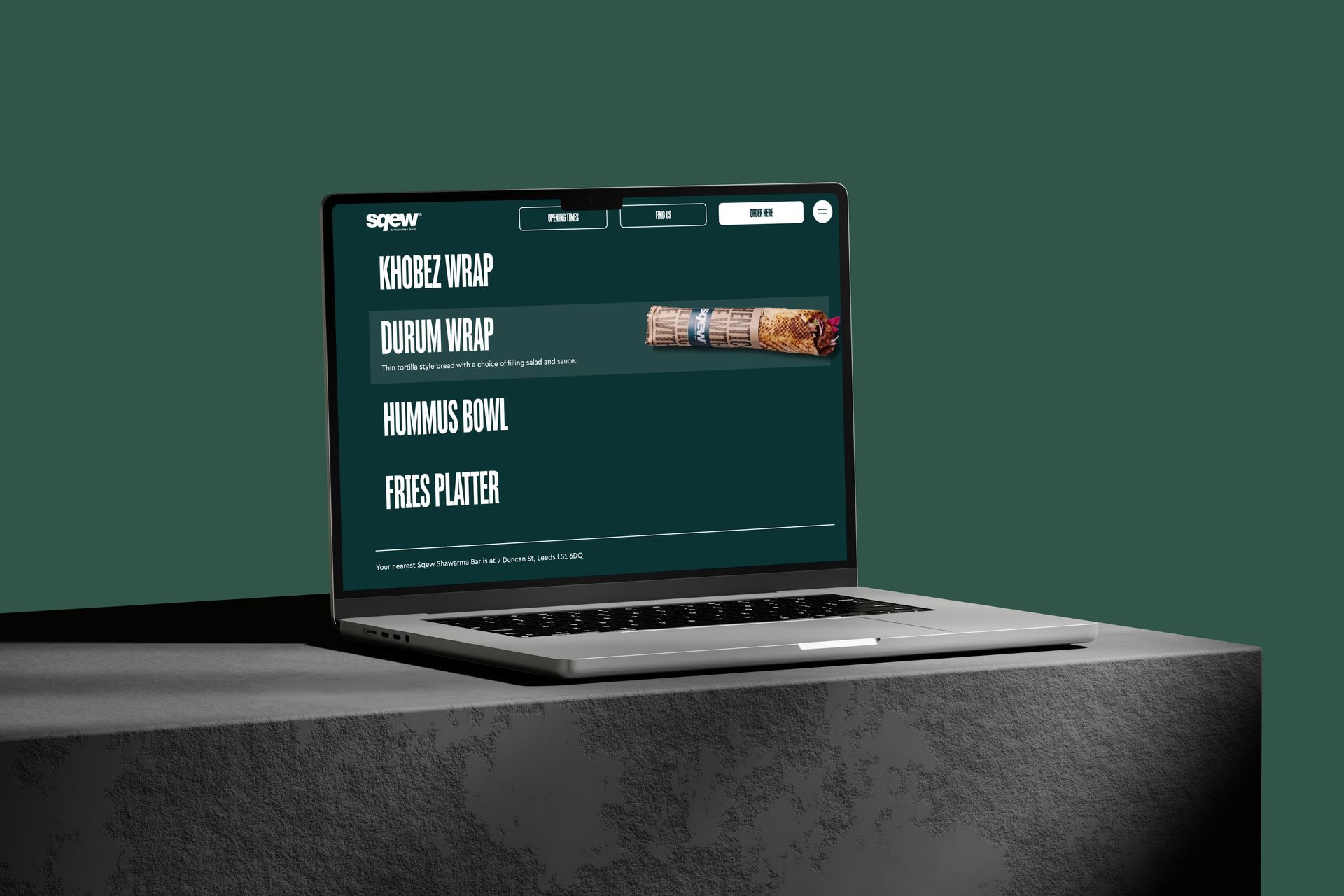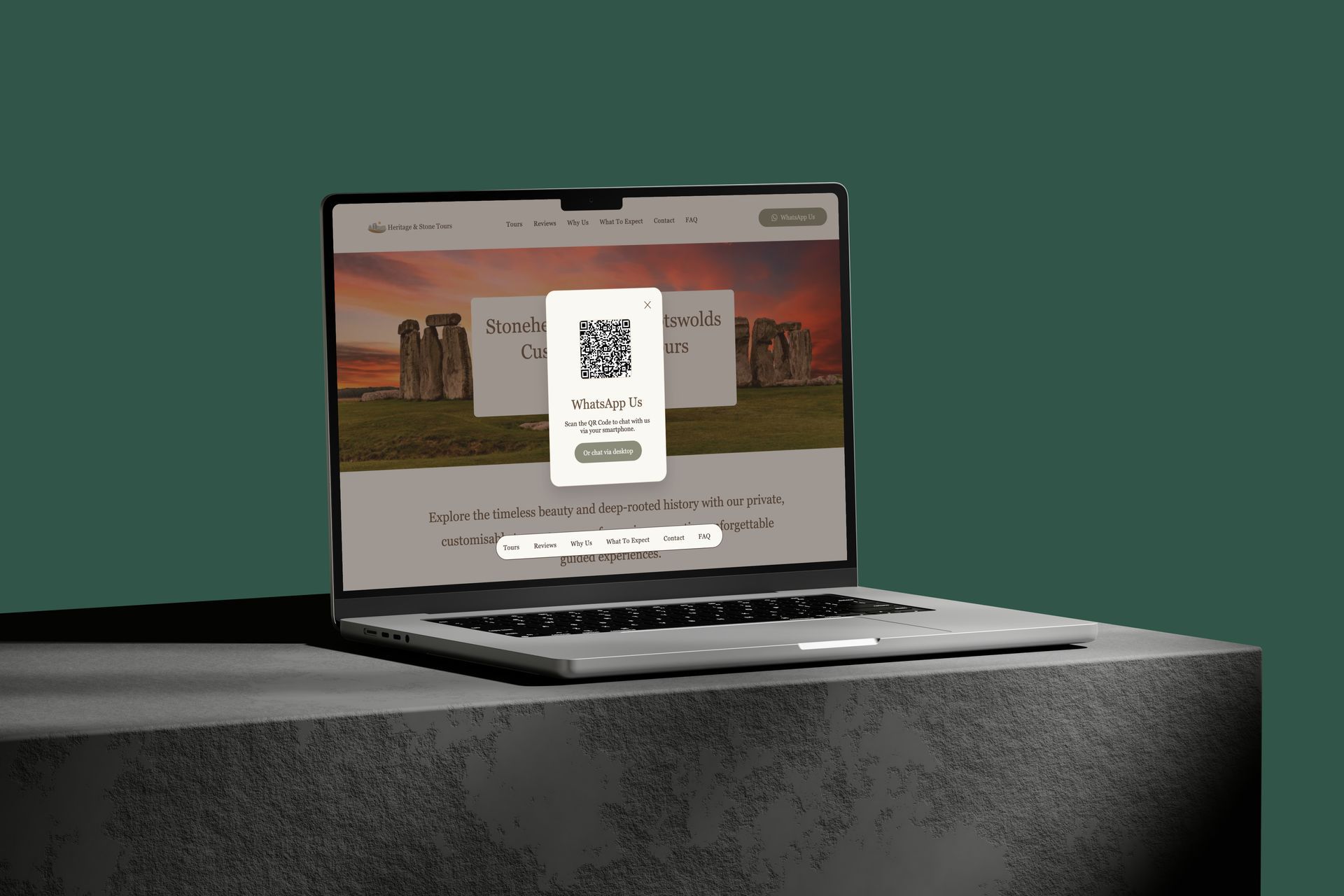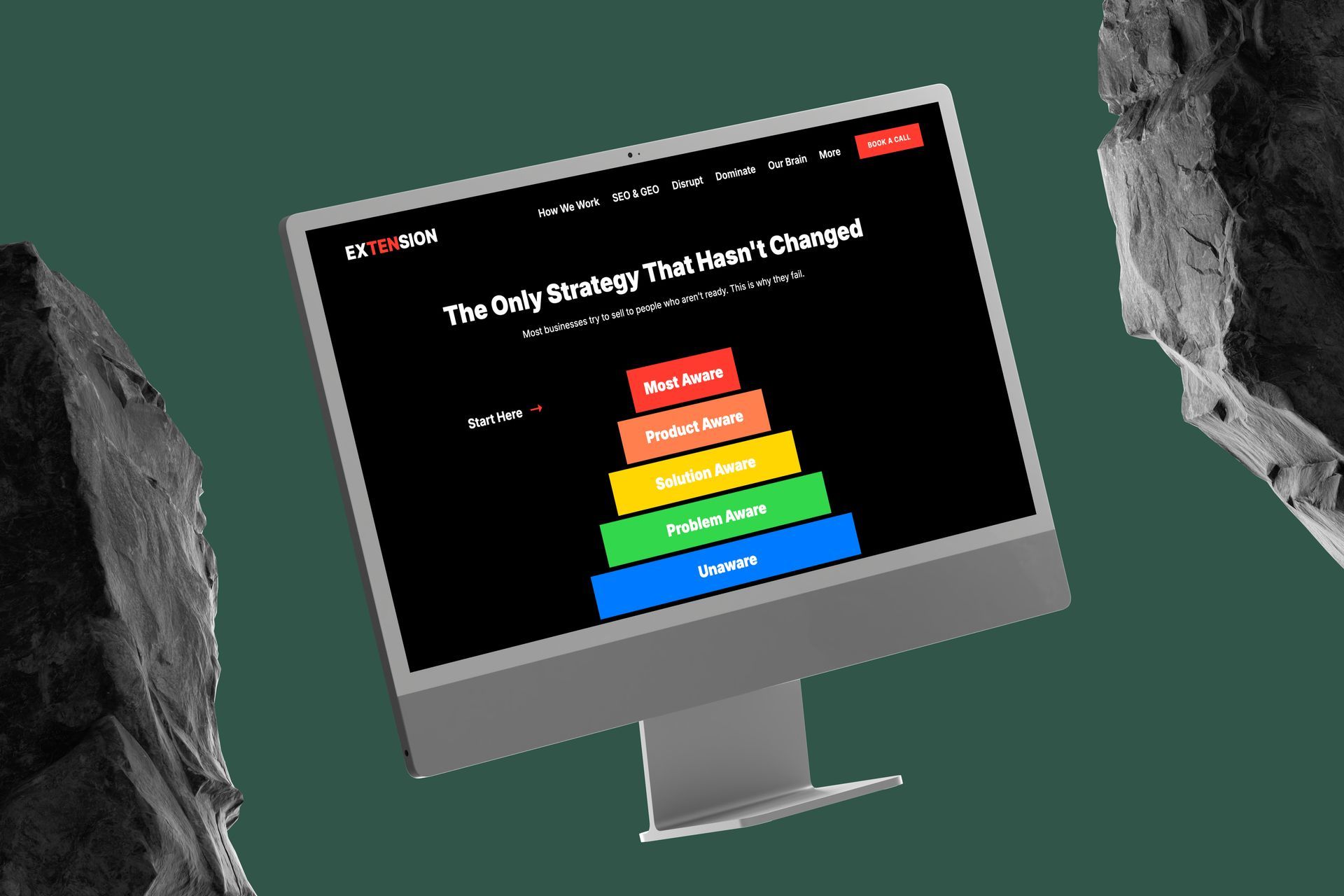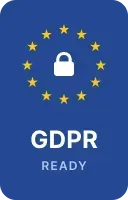Discover how we leverage AI technology to deliver multiple design iterations faster, while maintaining the human touch that makes your brand unique.
How Small Businesses Can Choose a Trusted UK Web Design Firm (2025 Guide)

Choosing the right web design agency is one of the most critical decisions for your small business's digital success. With 68% of UK businesses now maintaining a website , the quality of your online presence directly impacts your competitive edge. Whether you're launching your first website or redesigning an existing one, this comprehensive guide will help you navigate the selection process with confidence.
As a UK-based web design agency ourselves, we've seen firsthand how the right partnership can transform a business's digital presence. Let's explore the framework that will help you make an informed decision that drives measurable results.
1. Define Your Website Goals and Non-Negotiables
Before reaching out to any agency, crystallise your objectives. Are you primarily focused on generating leads, selling products online, or establishing brand authority? Each goal requires different design approaches, features, and technical capabilities.
Consider Sarah Mitchell, a Manchester-based consultancy owner who shared: "Having crystal-clear goals from day one prevented our agency from suggesting expensive add-ons that didn't serve our lead generation objectives. We knew we needed a site that converted visitors into consultation bookings, not just something that looked pretty."
Every modern small business website must include these core elements:
Mobile-First Responsive Design - With over 60% of web traffic coming from mobile devices, your site must perform flawlessly on smartphones and tablets. This isn't just about shrinking desktop layouts; it's about reimagining the user experience for smaller screens.
Lightning-Fast Load Times - Google expects pages to load in under 3 seconds. Every additional second of load time can reduce conversions by up to 20%. Professional agencies use optimised code, efficient hosting, and content delivery networks to achieve these speeds.
SEO-Ready Architecture - Your site's structure should make it easy for search engines to understand and rank your content. This includes proper heading hierarchies, clean URLs, and schema markup. Learn more about how visibility services can enhance your search presence.
Accessibility Compliance - Meeting WCAG 2.1 standards isn't just about avoiding legal issues; it's about ensuring your website serves all potential customers, including the 20% of the UK population with disabilities.
Seamless Integrations - Your website should work harmoniously with your existing tools, whether that's your CRM, email marketing platform, or booking system. The right agency will ensure these connections work smoothly from day one.

Take time to document these requirements before your first agency conversation. This preparation will save time and ensure you're comparing agencies on the same criteria.
2. Research and Shortlist UK Web Design Agencies
Start your search with focused Google queries like "best web design agency UK" or "recommended web design agencies for small businesses." Don't overlook local searches either – sometimes working with a nearby agency offers advantages for face-to-face collaboration.
Create a systematic evaluation spreadsheet tracking key factors for each agency you discover. Include their location (whether they're in London, Manchester, Leeds, or elsewhere), their specific industry focus, and their use of modern tools and technologies. Pay particular attention to agencies using AI-assisted design tools, which can significantly speed up the design process while maintaining consistency.
Industry platforms like Clutch provide valuable insights through verified client reviews. Also check curated lists of top web design agencies in the UK to identify firms with proven track records. These resources help you understand an agency's strengths, weaknesses, and typical project outcomes.
Aim for a shortlist of 3-4 agencies. This number provides enough options for meaningful comparison while keeping the evaluation process manageable. Include a mix of established firms and innovative boutique agencies to see different approaches and price points.
3. Evaluate Portfolios and Technical Capabilities
A portfolio reveals more than just aesthetic preferences – it demonstrates an agency's problem-solving abilities and technical range. When reviewing portfolio examples, look beyond surface-level design to understand the strategic thinking behind each project.
For each agency on your shortlist, examine at least three recent projects in detail. Pay attention to how they've addressed common business challenges through design. Does their work show visual originality while maintaining usability? How well do their mobile implementations work? Can you see evidence of SEO integration through clean code and proper meta tags?
The importance of exceptional user experience cannot be overstated. Research shows that 88% of users are less likely to return to a website after a poor experience. This statistic underscores why technical expertise matters as much as creative vision.
Request case studies that quantify results with specific metrics. A reputable agency should be able to demonstrate how their designs have improved client outcomes, whether through increased conversions, reduced bounce rates, or improved search rankings. Don't hesitate to ask for client references – trustworthy agencies will gladly connect you with satisfied customers.

Look for evidence of continuous learning and adaptation. The web design landscape evolves rapidly, and agencies that showcase diverse, modern approaches are more likely to create future-proof solutions for your business.
4. Verify Trustworthiness and Support Capabilities
In an industry where trust is paramount, thorough vetting can save you from costly mistakes. Start by checking ratings on platforms like Trustpilot, Google Business, and Clutch. Look for patterns in feedback rather than focusing on individual reviews. Are there recurring complaints about communication, missed deadlines, or inadequate post-launch support?
Tom Salmon, Co-Founder of Agency by Agency, emphasises: "Long-term support isn't just about fixing bugs—it's about evolving your digital presence as your business grows." This perspective highlights why you should prioritise agencies offering comprehensive post-launch services.
Given that the UK web design sector has experienced a -1.4% CAGR from 2020-2025 , it's crucial to verify your chosen agency's financial stability. You don't want your project abandoned midway due to an agency closing its doors.
Examine their support structure carefully. Will they provide ongoing maintenance, security updates, and SEO monitoring? What are their response times for urgent issues? Some agencies offer attractively low initial quotes but compensate with high ongoing fees. Ensure you understand the total cost of ownership over at least two years.
Ask about their approach to knowledge transfer. Will they provide documentation? Training for your team? Access to make minor updates yourself? The best agencies empower clients while remaining available for complex tasks. Understanding what you get from your partnership helps set realistic expectations.
5. Compare Proposals and Select Your Partner
When proposals arrive, resist the temptation to simply choose the lowest bidder. Create a detailed comparison matrix evaluating each proposal across multiple dimensions. Include project scope, timeline, total cost, specific deliverables, use of AI tools, and how they plan to integrate SEO and branding from the start.
Remember that good UX design can yield up to 400% conversion lift. This potential return on investment justifies investing in quality over seeking the cheapest option.
Develop a weighted scoring system to objectively evaluate proposals. Consider allocating points as follows: Technical Expertise (40%), Cultural Fit (25%), Transparency and Communication (20%), and Future-Proofing Capabilities (15%). This framework helps you make decisions based on comprehensive value rather than single factors.
Agencies embracing modern tools, particularly AI-assisted design platforms, often deliver superior results more efficiently. These technologies enable rapid iteration, ensure design consistency, and can significantly reduce project timelines without compromising quality. Use our project cost calculator to benchmark proposals against industry standards.

Pay attention to how agencies present their proposals. Clear, detailed documents with realistic timelines and transparent pricing indicate professionalism. Vague proposals or those pushing for immediate signatures often signal potential issues ahead.
6. Navigate Common Challenges and Roadblocks
Even with careful selection, projects can encounter obstacles. Understanding common challenges and their solutions helps you navigate issues effectively when they arise.
Scope Creep Prevention - Lock in a detailed statement of work from the beginning. Establish a formal change-order process that requires written approval and cost estimates for any additions. This protects both parties and maintains project momentum.
Timeline Management - Set specific milestone dates with clear deliverables at each stage. Consider including financial incentives for on-time delivery or penalties for delays. Regular check-ins and progress reports keep everyone accountable.
Brand Alignment Issues - If the designs aren't capturing your brand essence, don't wait until the final reveal to speak up. Request a brand-alignment workshop early in the project where you can thoroughly communicate your vision, values, and visual preferences.
SEO Performance Concerns - Don't assume SEO will be handled automatically. Request a comprehensive technical SEO audit within 30 days of launch. This should include site speed analysis, mobile optimisation checks, and recommendations for ongoing content strategy.
Consider that 75% of people judge a company's credibility based on website design. This statistic reminds us that while quick fixes might be tempting when facing challenges, maintaining quality standards is essential for long-term success.
Frequently Asked Questions
How much should a custom web design project cost for a small UK business?
Professional custom websites typically start around £5,000 for a mobile-responsive site with basic SEO and content management capabilities. More comprehensive projects featuring advanced e-commerce functionality, custom integrations, or AI-powered features may range from £8,000 to £12,000. Remember that this investment often pays for itself through improved conversions and reduced long-term maintenance costs. For a detailed estimate tailored to your needs, try our instant project calculator.
How long does a typical web design project take from brief to launch?
Most professional web design projects require 8 to 12 weeks from initial brief to launch. Simple brochure sites might be completed in 6-8 weeks, while complex e-commerce platforms or sites requiring custom functionality can extend to 16 weeks or more. The timeline depends on factors like content readiness, revision rounds, and integration complexity. Agencies using modern design tools and efficient processes can often deliver faster without compromising quality.
What red flags indicate an agency might be unreliable?
Watch for these warning signs: reluctance to provide recent portfolio examples or client references, vague or constantly changing pricing, pressure to sign contracts immediately without time for review, multiple negative reviews mentioning the same issues (especially missed deadlines or poor communication), and unwillingness to discuss post-launch support or provide clear service level agreements. Trust your instincts – if something feels off, it probably is.
Should I prioritise agencies that use AI tools and modern design platforms?
Yes, agencies leveraging AI-assisted design tools and modern platforms often deliver superior results more efficiently. These technologies enable rapid prototyping, ensure design consistency across all pages, and can significantly reduce revision cycles. However, ensure the agency combines these tools with human creativity and strategic thinking rather than relying on them exclusively.
How can I ensure the agency will handle SEO and branding cohesively?
Request a combined SEO and branding strategy document as part of the proposal. This should outline how they'll conduct keyword research, implement on-page optimisation, and ensure your brand message resonates throughout the site. Look for agencies that view all services as interconnected rather than treating them as separate deliverables. The best results come from integrated approaches where branding, design, and SEO work in harmony.
What if the project goes over budget or timeline?
Protect yourself with a comprehensive contract including clear change-order procedures and defined penalties for delays. Build a contingency fund of 10-15% of the project value into your budget. Establish regular communication protocols with weekly progress reviews and milestone checkpoints. If issues arise, address them immediately rather than hoping they'll resolve themselves. Most problems can be solved through open communication and mutual flexibility.
Taking the Next Step
Selecting the right web design partner is a crucial decision that impacts your business's digital future. By following this framework – from clarifying your goals to navigating potential challenges – you're equipped to make an informed choice that aligns with your business objectives and budget.
Remember that the best agency relationships are partnerships built on trust, clear communication, and shared goals for success. Take your time with the selection process, ask plenty of questions, and don't hesitate to request clarification on anything unclear.
Ready to explore how a professional web design can transform your business? Get in touch to discuss your project, or use our project calculator to get an instant estimate tailored to your specific requirements. Your perfect digital presence is closer than you think.




